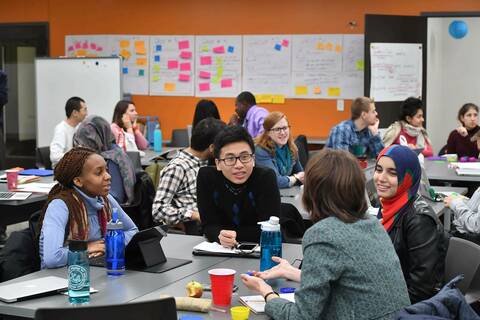i-Lab

ABOUT THE INTEGRATION LAB
What We Do
The University of Notre Dame Keough School’s Integration Lab, or i-Lab, was established to help organizations like Catholic Relief Services, Corning, and the U.S. State Department find ways to tackle complex social challenges by doing global development differently. They found that collecting data in countries all over the world to evaluate the efficacy of programs helps identify opportunities to get ahead of challenges, sense opportunities sooner, and outpace change.
The i-Lab also considers that the best solutions come from people at the heart of an issue, those with lived experience — and ensures these groups are involved at each stage.
i-Lab Projects are broken down into the following phases:
-
Initiate — Set strategic direction with organizational partners to ensure project plans align with sponsors’ priorities.
-
Ideate — Workshop ideas to align stakeholders and collect as many insights as possible by involving a broad range of partners while creating an infrastructure for evidence-building (collecting and organizing data).
-
Execution — On location, frequently in the Global South, physically collecting and coding textual data for qualitative or quantitative analysis, often obtaining feedback through surveys and focus groups.
- Analyze and Summarize — Data analysis and visualization, using the data to build and share interactive applications to illustrate proposed solutions and opportunities and present the information to sponsors.
Taking an iterative approach, the i-lab has delivered a variety of global projects across various themes, including agricultural growth and food security, metrics to assess the impact of coordinated stabilization efforts, and helping emerging economy homebuilders be more value-conscious.
The i-Lab is comprised of Keough School Master of Global Affairs students, three core faculty members, a program manager, and faculty consultants from across campus.
i-Lab teams travel as a group of four to five to different parts of the world to collect data. Returning to campus, they reflect together on what they have learned and, from their data outputs, present conclusions to sponsor organizations.
The i-Lab is taking a different approach to policy and service delivery, focusing on the experiences and needs of users to devise innovative and effective solutions to address a range of social challenges.
Why We Do It
Decision-makers need the best available information relevant to the problems they’re trying to solve — and the i-Lab provides that information through rigorous research that is accessible and usable. i-Lab techniques substantially reduce the transmission cycle between research, response, and service delivery and lead to better insights by forging links between end users and those who manage and govern.
In one project, an i-Lab team worked with Oxfam America to develop a U.S. Care Policy Scorecard to assess the federal care policy landscape by scoring 30 indicators related to unpaid and underpaid care work, including labor conditions and wage policies. The Scorecard is designed to measure each care policy indicator in relation to its design, implementation, and impact.
With an aggregate score of 43 percent, the i-Lab found the U.S. meets less than half the U.S. Care Policy criteria, and federal unpaid and underpaid care work policies are severely lacking. They also determined that females of color and immigrant women are most harmed.
The solutions the i-Lab comes up with go beyond dealing with a part of the whole or symptoms and address the root cause of why things are not working in the first place.
With the i-Lab, the Keough School and its Pulte Institute for Global Development provide ever-increasing opportunities for Master of Global Affairs students to explore diverse career pathways by engaging in hands-on experiences. The learning-by-doing approach allows MGA students to be immersed in work environments, acquiring and applying skills needed for careers in global development.
Who We Are
The Pulte Institute for Global Development, an integral part of the Keough School, addresses complex social challenges. The Institute works in over 70 countries with hundreds of partners to turn research into effective public policy.
The Pulte Institute team running the i-Lab represents a new breed. They’re not simply academics or researchers, nor are they entrepreneurs. They are all the above, focusing — along with academics and researchers across Notre Dame departments, institutes, colleges, and schools — on solutions for some of the world's most difficult challenges.
The i-Lab Core Team
-
i-Lab Academic Director, Pulte Institute Director and Professor of Engineering and Global Affairs Tracy Kijewski-Correa
-
i-Lab Administrative Director, Pulte Institute Entrepreneurship and Education Director and Professor of the Practice Melissa Paulsen
-
i-Lab Program Manager Alan Medina Hernandez